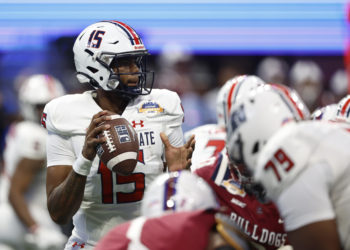In an email interview, he talked about naming characters and why all the books in his spy series have two word titles. SCOTT HELLER
What books are on your night stand?
“The Predicament,” by William Boyd; “frank: sonnets,” by Diane Seuss and “The Eights,” by Joanna Miller.
How do you organize your books?
Organize books? How would that work?
Are there books or authors from childhood that stick with you?
One I’ll never unstick myself from is “The Wind in the Willows,” a classic often regarded as a heartwarming tale about talking animals, but which is actually rife with criminal behavior — speeding offenses, contempt of court, jailbreak, identity theft, horse rustling, hate speech (“onion sauce!”), coercive deprogramming, child abduction, grooming, home invasion, vigilantism, carol singing … Barely a page goes by without some new horror. And it’s also a heartwarming tale about talking animals.
How do you name your characters?
Either a name lands immediately (like “Jackson Lamb”), and I never question it, or it takes work — I’ve written passages in which a character is identified by an X while I wait for something better to arrive. .
How do you sign books for your fans?
I often thank them for being readers. Without that small detail, neither they, nor I, nor the book being signed, would be present.
“Clown Town” has a great first line. Did you start there, or come to it later?
It came later, but it’s the first big hurdle. I never start writing at Page 1 — I like to have a fair amount of material to hand first: descriptions, character introductions, passages of dialogue and so on. Much of that will be discarded, but it helps to know it’s there. Writing the opening is when the hard work starts, so having the right first line is crucial. Rhythm plays an important part. Rhythm bestows memorability. At the same time, you don’t want it to be rum-ti-tum-ti-tum.
You’ve said that poetry is a big influence on your writing. Are there poems or poets that have seeped into this book?
Not as obviously as in “Bad Actors,” the opening line of which reads: “The woods were lovely, dark, and deep, and full of noisy bastards.” (A copy editor tried to remove that second comma. I asked her to take it up with Robert Frost.)
But the influence seeps deeper than simply quoting lines or making allusions. In poetry, every syllable counts. It can often be overlooked that that’s just as important in prose, especially if you aspire to humor — a punchline delivered in five syllables is more than twice as effective as one that takes 10. Rhythm and brevity are among poetry’s lessons.
Could there be a Slough House book without a two-word title?
No. I hate to use the word “branding” with reference to my Slough House novels, but, you know … branding.
Why are the Brits so good at capturing political bureaucratic skulduggery in their novels?
Because political bureaucratic skulduggery is in our bloodstream, like cricket, embarrassment and binge drinking.
How do you keep current on micro-tensions in office life now that you no longer work in an office?
Some things you never forget. Besides, such micro-tensions are born of human interaction, human behavior, and we’re unlikely to have evolved beyond them in the space of less than a decade. Office life now, underneath new technology, is the same as it always was.
Can a great book be badly written? What other criteria can overcome bad prose?
No. Once (not sure it happens so much these days), you’d occasionally hear that a novel has such a cracking story line that it carries you beyond the poor prose — you know the kind of thing: “the characters may be wooden, and the dialogue stilted, but you really want to know what happens next.” Not me. If the characters are wooden and the dialogue stilted, I don’t care what happens next. Conversely, good prose can carry you through a novel whose plot is implausible, or difficult to discern.
As far as overcoming poor prose goes, if they gave away free stuff with bad novels it might help.
Disappointing, overrated, just not good: What book did you feel as if you were supposed to like, and didn’t?
There’ve been plenty, but life’s too short, and writing too difficult, to deliver blasts against books that disappointed. The one-star review — I’ve said this before — is the domain of the bitter and the thwarted. Anyone who’s put all they can into writing a book deserves, at the minimum, respect. In public, anyway.
What’s your favorite book no one else has heard of?
You wouldn’t have heard of it.
If you were to write something besides spy stories, what would you write?
To-do lists, mostly.
The post Mick Herron: What I’m Reading (and Why ‘Wind in the Willows’ Scares Me) appeared first on New York Times.




